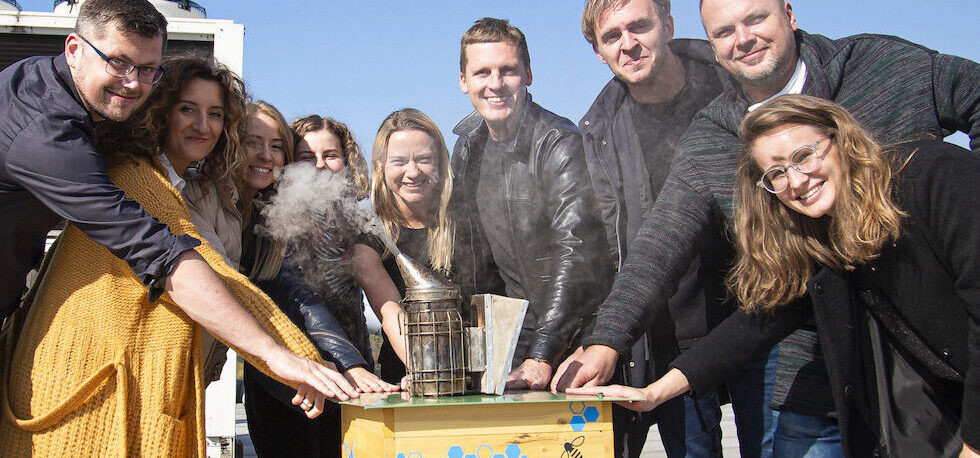How urban beekeeping contributes to sustainable urban development and improves environmental and social impact scores
The climate crisis and the decline of biodiversity are no longer topics solely addressed by naturalists or activists; they have become part of our daily discourse in public life. A person is not merely an individual but also a component of society and a broader system, whether it be a city, a country, or the entire planet. Therefore, environmental issues affect every individual as part of this larger system. The good news is that collective responsibility and being part of the system enable the sharing of this responsibility and contribute to problem-solving.
Urban system and businesses
The majority of society lives in cities, disconnected from nature and its importance to emotional and physical health. Urban residents often do not feel as a part of the environment and live separately from the surrounding nature, diminishing their sense of responsibility and willingness to contribute to its preservation. However, every city dweller has the opportunity to contribute to the preservation and development of their environment.
Businesses, much like city residents, are integral components of urban systems and, as such, bear responsibility for their surroundings.


Until recently, businesses functioned as separate entities. However, in recent years, an increasing number of businesses are reverting to nature and seeking solutions to collaborate with it. More corporate leaders are becoming conscientious, acknowledging themselves as integral parts of urban and environmental ecosystems.
Businesses are beginning to recognize the responsibility they hold as members of their environment and the impact they can have on sustainable development.
Urban beekeeping is one way in which businesses can contribute to the sustainable development of cities and environmental restoration right this second.
Our clients share their success stories about how bees in their environment contribute to the preservation of pollinators:


The importance of social and environmental impact
While the number of socially responsible businesses is increasing, stricter measures are still needed to encourage more companies to follow suit and take action for environmental conservation.
Businesses’ social and environmental responsibility can be described by the universally recognized Environmental Social Governance (ESG) model.
Environmental, Social, and Governance (ESG) factors are crucial considerations when assessing a company’s sustainability and its societal impact. This model, although not novel, plays a pivotal role in evaluating corporate responsibility.
The concept of ESG was initially highlighted by the United Nations in 2004 to prompt investors to contemplate long-term investments and environmental shifts affecting businesses and economies at large. ESG reporting encompasses both environmental and social factors.
Environmental ESG factors encompass various aspects of a company’s activities aimed at reducing pollution, implementing recycling and resource management, utilizing renewable energy sources, and minimizing greenhouse gas emissions. These efforts also include enhancing biodiversity index in the environment.
Social ESG factors focus on the company’s relationships with its employees and local communities. This involves considerations such as fair labor practices, community engagement, and social impact initiatives.
The ESG reporting is becoming stricter
For a considerable time, ESG criteria have functioned more as guidelines than obligatory measures. However, commencing in 2024, the European Union, as part of the European Green Deal, is beginning to tighten ESG requirements.
Organizations are obligated to provide information concerning how their business activities affect the planet and its people, as well as how their sustainable development objectives, measures, and risks impact their financial standing.
Starting in 2025, EU companies subject to the Non-Financial Reporting Directive and employing over 500 workers must submit ESG reports alongside their standard financial reports by year-end. With each passing year, more companies will be added to the mandatory ESG list, and by 2028, businesses from third countries will also be required to submit social responsibility reports.

Biodiversity index to illustrate positive environmental action
Most companies are beginning to calculate their carbon footprint or invest in reforestation. While these decisions are purposeful, their effectiveness is only justified after long processes requiring time and extensive resources.
However, even though carbon dioxide is a primary target for climate change, often these calculations are inaccurate, and other fields such as biodiversity are pushed into the background.
Urbanbee.lt conducts assessments of environmental biodiversity index by employing laboratory analysis of honey and pollen.

Beehives on building rooftops offer an opportunity to take action now, rather than waiting for saplings to mature into forests.
Urban beekeeping directly contributes to preserving biodiversity and pollinators, which are the cornerstone of a healthy ecosystem. A healthy and green ecosystem regulates excess carbon dioxide and filters other pollutants.
Like humans, pollinators are a crucial part of the ecological system, arguably the most significant one. Pollinator activity significantly impacts healthy and thriving vegetation, which absorbs excess greenhouse gases.
Urban beekeeping and positive environmental impact
- By collecting nectar, bees pollinate (urban) plants and improve the quality of vegetation.
- The greener the surroundings, the more CO2 emissions are absorbed and the microclimate is cooled.
- Plants pollinated by bees provide more nutritious and resilient fruits and vegetables.
- High quality urban greenery contributes to higher biodiversity index in the area and helps to improve ecosystem self-regulation.
- Plants pollinated by bees are healthier, thus city dwellers can grow their own food and lower the demand for imported goods.
- Urban beekeeping allows us to educate urban residents about the importance of bees and biodiversity.

Urban beekeeping and positive social impact
- Hives help achieve green building certifications (BREEAM, WELL) for company buildings and increase the value and attractiveness of real estate to potential tenants.
- Working with bees lowers the stress levels, improves productivity and mindfullnes.
- Bee hives offer an opportunity for urban dwellers to gain insight into the life of bees and educates the younger generation about the importance of bees.
- Bees provide the opportunity to share accurate data and figures (such as honey production, bee population, and their foraging area) in ESG reports - precise numbers ensure transparency and reliability.
- Certain financial decisions (such as better loans) become available when supporting sustainable activities.

An increasing number of investors, when deciding where to allocate their investments, now consider not only a company’s activities but also evaluate them based on ESG criteria. A commitment to long-term changes signals the company’s ability to adapt to evolving conditions and demonstrates management’s capability to mitigate potential risks. Beehives showcase the company’s dedication to sustainable development and its readiness to adapt to a changing environment, thereby enhancing investor confidence and public trust.
